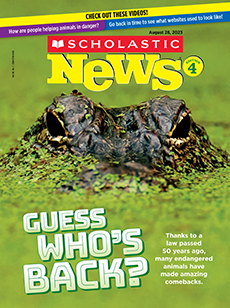The Center for Great Apes
If you think you wash your hands carefully, you should see Sandra the orangutan. Sandra uses a brush and soapy water to scrub her long fingers for nearly a minute at a time.
About a year ago, a video of Sandra went viral. A caption explained that the ape had learned to wash her hands after watching zookeepers do it during the Covid-19 pandemic. Thousands of people shared the story on social media.
But it turns out that the tale wasn’t exactly true. The ape’s handwashing was actually filmed in November 2019—before anyone knew about Covid-19.
The story is one in a long string of false or misleading claims that people have posted and shared online. Deciding what to believe can be a challenge. Here are our top tips for figuring it out.

